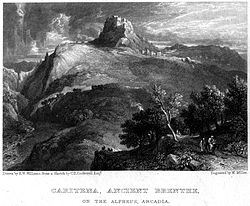Geoffrey of Briel
Geoffrey of Briel, in older literature Geoffrey of Bruyres, was a French knight and the third lord of the Barony of Karytaina in the Principality of Achaea, in Frankish Greece. He led a colourful and turbulent life, narrated in detail in the Chronicle of the Morea. Accounted the finest knight in the Principality, he fought in the wars against the Byzantine Greeks, was captured in the Battle of Pelagonia in 1259, and was sent back to Achaea bearing the Byzantine terms in 1261. Geoffrey was twice deprived of his barony, once for rebelling against his uncle, the Prince of Achaea William II of Villehardouin, and then for abandoning the Principality without leave in order to spend time with a mistress, the wife of one of his feudatories, in Italy. He was pardoned both times, but henceforth held his title as a gift of the Prince. He died childless in 1275, and the Barony of Karytaina was split up.
Geoffrey was born in Greece, possibly in Karytaina, soon after his fathers arrival there . Hugh of Briel died in early 1238, not yet forty years old, and was succeeded by the young Geoffrey. The main source on Geoffreys life are the various versions of the Chronicle of the Morea, which, in the words of A. Bon, narrates with so much detail and indulgence the many and colourful adventures of a peculiar and charming figure, very representative of the generation of Frankish seigneurs born in Greece. The Chronicle credits Geoffrey with the construction of the castle of Karytaina, the Greek Toledo as William Miller calls it. Geoffrey enjoyed a high reputation as a warrior, and was deemed to be the best knight in the Morea. According to the Aragonese version of the Chronicle he maintained a school of chivalry at the castle Karytaina, where the sons of the Greek nobles were trained as knights in the Western manner.
Source: Wikipedia

